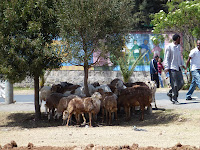Does Ethiopia Need an Electronic Medical Record?
 Last week I visited a hospital in Addis Ababa. It was set-up much like all hospitals across
the world, with an Outpatient and Inpatient departments, a
laboratory, pharmacy and drugstore. However, the buildings were old
and dirty and the corridors were filled to overflowing with
patients many who looked in desperate need of care. Doctors and
nurses say they understaffed and overworked.
Last week I visited a hospital in Addis Ababa. It was set-up much like all hospitals across
the world, with an Outpatient and Inpatient departments, a
laboratory, pharmacy and drugstore. However, the buildings were old
and dirty and the corridors were filled to overflowing with
patients many who looked in desperate need of care. Doctors and
nurses say they understaffed and overworked.
I am here to evaluate
an electronic medical pilot, which the government intend to rollout
across 3,000 hospitals and health centres by 2015. This is in a
country in which many areas do not have electricity and those that do
are prone to power cuts (even here in Addis I have been without power
for more than 24 hours), few people have computer skills and the
existing paper based medical record keeping system is poor.
Whilst there are many
potential benefits from electronic medical records, few developed
countries have realised many of them and the effort required to do
this is immense. This raises the question for me of whether Ethiopia
really needs electronic medical records at this time. Maybe the money
could be spent better? But then who is driving the implementation of
electronic medical records? There are many donor
organisations who have an interest and involvement in this.

























